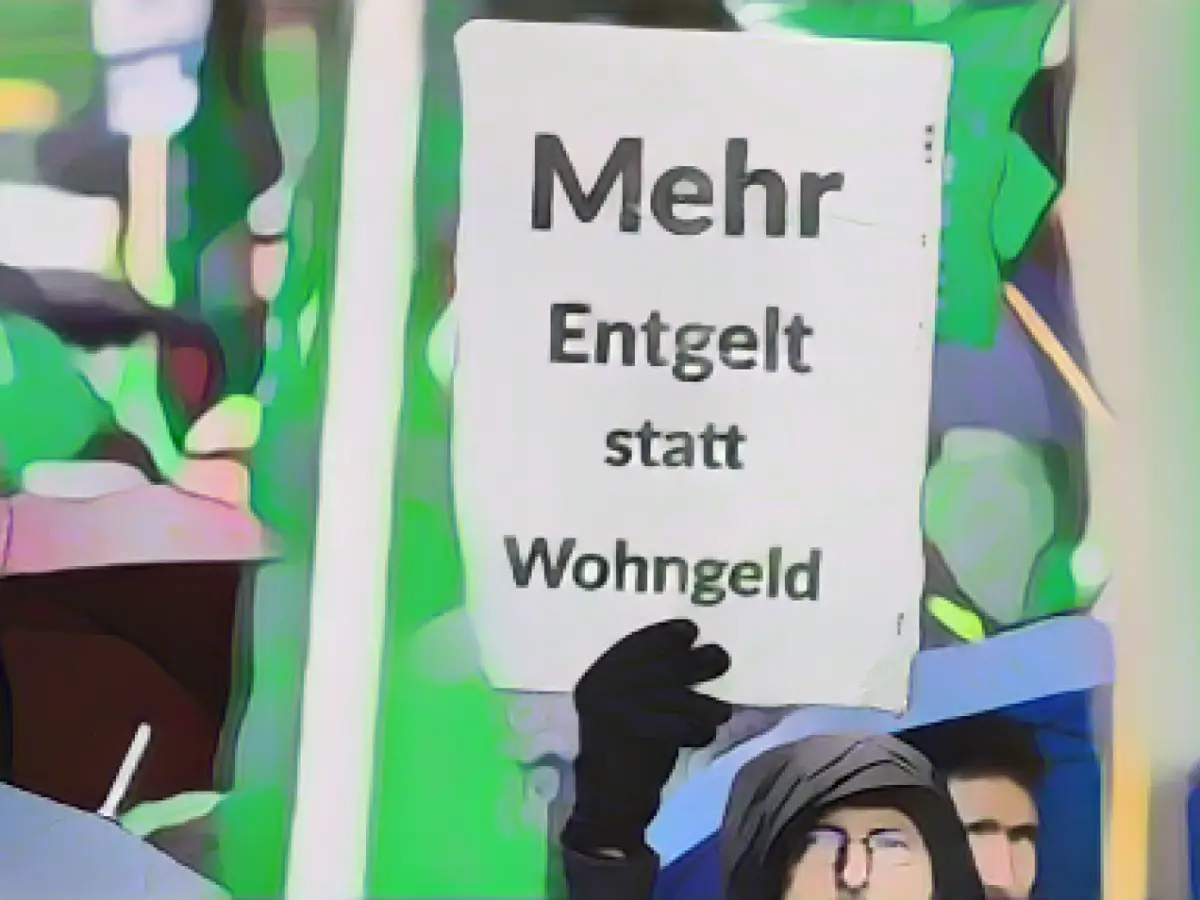Collective bargaining round - Wage dispute in the public sector: more money demanded
In a major demonstration in Düsseldorf, around 15,000 employees demanded significantly more money in the wage dispute for the public sector of the federal states. The national chairman of the Verdi trade union, Frank Werneke, emphasized in front of the Düsseldorf state parliament on Tuesday: "We are campaigning for the real wage loss to be compensated." Addressing the black-green government led by Hendrik Wüst (CDU), he called out: "We expect the state government to exert influence so that we have a positive negotiation result in the third round. Otherwise we will be back!"
The chairman of the dbb civil servants' association, Ulrich Silberbach, said: "There has never been as much money in the tax pots as there is now. It just needs to be distributed fairly." Verdi and dbb are demanding a 10.5 percent wage increase, but at least 500 euros more. The employers of the Tarifgemeinschaft deutscher Länder (TdL) reject this as unaffordable. The third and possibly decisive round of collective bargaining starts this Thursday in Potsdam.
In addition to Verdi and dbb, the education unions VBE and GEW, police unions and tax unions also organized two parallel rallies in the morning. According to spokespeople, thousands of people gathered there. At midday, demonstrators marched through the city center to the state parliament, where, according to police and Verdi, around 15,000 people gathered. Placards held by demonstration participants read "I want to live, not survive" or "Warm words don't heat" and "More pay for us is worthwhile for everyone".
GEW and the NRW police union (GdP NRW) warned: "Hendrik Wüst's government is risking the future viability of the state administration." Competitive wages and salaries had no longer been paid for some time, and as a result, the shortage of skilled workers and work pressure were intensifying. "The attractiveness of the public sector must be significantly increased," they warned in a press release.
When asked by dpa, a dbb spokesperson emphasized: "The frustration runs deep." Teachers, tax administration employees and even police officers are on the streets. Civil servants - who are not allowed to strike - had also taken time off for their protest. According to the unions, state employees from university hospitals, universities, the judiciary and the state administration went on warning strike across the state.
According to dbb-Landesbund, there are around 26,000 vacancies in the state's public sector in NRW, with a collapse looming in the medium term. The GEW emphasized that there is a shortage of almost 7,000 teachers in NRW. The VBE state association emphasized that all school staff had demonstrated flexibility, resilience and professional competence under extraordinary pressure in recent years. "Now it is up to the employers to reward this performance appropriately." The GdP regional association accused the employers of "deeply disrespectful" treatment.
Read also:
- The United Services Union, a key player in the collective bargaining round, stands firm in their demand for a significant wage increase in the public service sector.
- The Large demo in Düsseldorf, organized by various unions including Verdi and dbb, aimed to pressure the employer and the collective bargaining association of German states tdl during the wage dispute.
- Hendrik Wüst, the CDU leader of NRW's black-green government, faces criticism from the unions for not exerting enough influence to secure a positive outcome in the wage dispute's third round.
- The civil service association stressed the need for a fair distribution of the large amount of money in the tax pots, as they demand a 10.5 percent wage increase and at least 500 euros more.
- The third round of collective bargaining starts this Thursday in Potsdam, with the stakes being high as the employer and collective bargaining association of German states tdl reject the unions' wage increase demands.
- Frank Werneke, the national chairman of Verdi, and Ulrich Silberbach, the chairman of the dbb civil servants' association, led the march during the demo in Düsseldorf, calling for the state government's intervention in the wage dispute.
- GEW and the NRW police union (GdP NRW) warned that Hendrik Wüst's government is risking the future viability of the state administration by failing to address competitive wages and salaries in the public sector.
- The silver brook, a symbol of the public sector's wage dispute, now flows into the heart of Düsseldorf as the unions appeal for a fairer compensation for their services.
- The education unions VBE and GEW, police unions, and tax unions joined Verdi and dbb in organizing parallel rallies, with thousands of people demonstrating for higher wages and better working conditions.
- Despite not being allowed to strike, civil servants in NRW actively participated in the large demo, signaling their dissatisfaction with the current wage dispute and the need for a positive resolution in the third round of collective bargaining.
Source: www.stern.de








